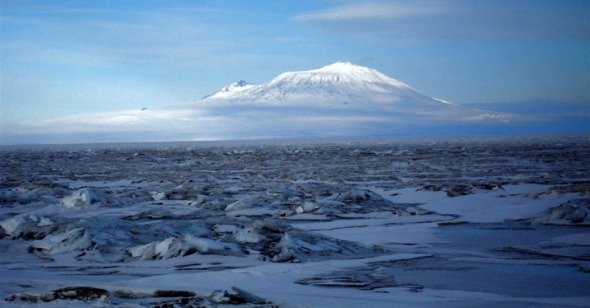Cold Comforts
By Nick Pinkerton
Encounters at the End of the World
Dir. Werner Herzog, U.S./ Germany, IFC Films
Encounters at the End of the World is the latest missive from world cinema’s Marco Polo / Jack London / Great White Image Hunter, Herr Werner Herzog, out for a deserved large-screen airing before entering its inevitable Discovery Channel rotation. The spoils of Herzog’s latest expedition are an enjoyably idiosyncratic series of home movies. Lured by ethereal underwater scenes shot beneath Antarctica’s ice, and funded by the National Science Foundation, Herzog disembarks to the tamed final frontier, on the trail of Ernest Shackleton, whose expedition haunts the film in gray archival footage, and whose preserved base of operations is visited before film’s end.
Herzog sets up camp at McMurdo Station, a collection of bunker-like dormitories arranged in a microchip grid, a patch of tainted snow overlooking the blank vastness of the Ross Sea. The town houses a few hundred residents, “people who have the inclination to jump off the map”—Herzog’s interviewees include a forklift operator who freely quotes from Alan Watts and a journeyman plumber who, in one of those uncomfortably formal framings that the director loves to hang on to, holds up his big, oddly shaped mitts for the camera, citing them as genealogical evidence of royal Mayan ancestry. In the main, though, his subjects are the descendants of Shackleton, research scientists conquering their tiny kingdoms of expertise: volcanologists describing the best tactic to duck incoming magma, cell biologists descending through punctures in the ice to swim in the protozoan soup, responsible for the movie’s keystone images of spectral, ectoplasmic organisms undulating beneath the ice.
The authorial voice is equal parts doomsday soothsayer (the End of Man is prophesied, or at least alluded to) and crank, digressing into unqualified antipathies for yoga, “tree-huggers,” and academia. As befits a man who’s become a hot lecture circuit ticket, Herzog’s got a good sense of how to use his trudging, Bavarian-accented deadpan for comic effect, as when cutting in on the soundtrack to interrupt one professional vagabond overeager to share her road tales (“Her story goes on forever”). The anti–March of the Penguins angle comes across as a tad labored at times—Herzog focuses on what’s identified as a “mad” penguin, errantly waddling into certain oblivion—but hell, it’s a crowd-pleaser.
I find it easy to get frustrated with Herzog, if only because I doubt I’ll ever like what he’s doing now in quite the same way, or quite as much, as anything from his otherworldy good Signs of Life (1968) to God’s Angry Man (1980) streak. I may be in the minority, but Herzog’s subjects interest me far more than Herzog himself, or his musings on them. I am operating having seen only a fraction of the filmmaker’s fecund output, but the pattern therein is an increased hesitance to let things speak for themselves; this is perhaps understandable in one who has been gravely misunderstood in the past, but watch (or rewatch) Land of Silence and Darkness for a sense of the mystery that’s been lost. This is, of course, an unfair standard to hold anyone to. The fact is that Mr. Herzog has made a good movie, and there is no surfeit of those, and just one of his jellyfish is worth a thousand goddamn WALL•Es.
